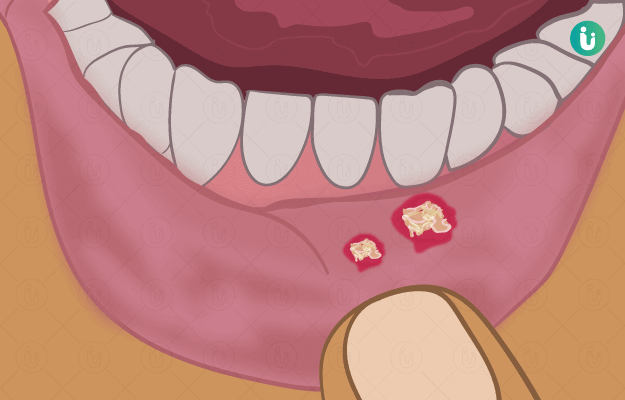What are canker sores?
Canker sores are tiny lesions or ulcers that form in the tissue at the base of the gums. Also called aphthous ulcers, these are not contagious, but can be painful and cause immense difficulty in basic functions like eating and talking.
What are its main signs and symptoms?
Canker sores usually form under the tongue, on the inside of the lips or cheek, or at the base of the gums. They look oval, with a whitish-yellow centre and red border. A tingling sensation or burning could also be felt around the canker sores. Symptoms for various kinds of canker sores are:
Minor sores
- Very tiny
- Oval shaped
- Heal on their own in about a week, leaving no scars
Major sores
- Larger and deeper
- Well defined
- Very painful
- Take several weeks to heal and often leave large scars
Herpetiform sores
- Are minute
- Form in clusters which come together to form a large ulcer
- Heal in a fortnight without scarring
What are its main causes?
Canker sores can occur for a variety of reasons, often as a combination of a few.
- Injury from biting the cheek
- Brushing too long, hard or vigorously
- Sodium lauryl sulphate found in toothpaste
- Sensitivity to certain foods which may be too oily, spicy, acidic or contain dairy or nuts
- Deficiency of zinc, vitamin B12, or folic acid
- Presence of ulcer-causing bacteria
- Hormonal changes in females
- Stress
- Diseases like Celiac, inflammatory bowel disease, Behcet’s disease, or HIV infection/AIDS
How is it diagnosed and treated?
An examination of the mouth and ulcers is sufficient to diagnose canker sores. The doctor may advise some tests if he feels there are some conditions underlying the problem, or if the sores persist for too long.
There are several courses of treatment available, and the doctor would typically advise:
- Mouth rinses containing dexamethasone for inflammation and pain
- Topical applications like ointments or gels which contain hydrogen peroxide, fluocinonide or benzocaine
- Oral medicines depending on the suspected cause
- Burning or destroying the sores
- Supplements for deficiency .e.g., vitamin B12, folate or zinc supplements
- Dietary modifications including avoidance of spice, dairy, nuts, oily food or acidic foods and to improve dietary intake of deficient nutrients
- Improved oral hygiene
- Managing stress better
(Read more: Mouth ulcers treatment)

 OTC Medicines for Canker Sores
OTC Medicines for Canker Sores















